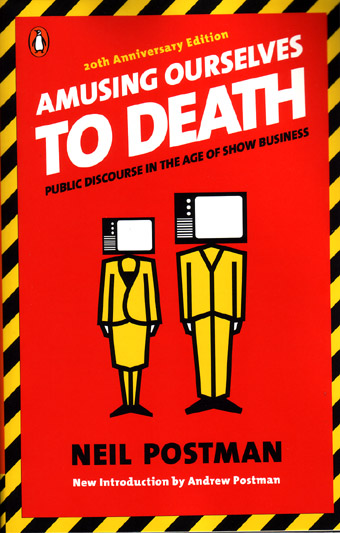
Amusing Ourselves to Death : Public Discourse in the Age of Show Business is an enlightening book, and is an easy read. It was written over twenty years ago, back in 1985, but it's even more relevant now than it was then.
Its author, media theorist Neil Postman, is now dead, but Penguin published a 20th anniversary edition of the book, with a preface by Postman's son.
Postman argued that the change from the Age of Typography (the printed word) to the Age of Television has not only had a huge impact on Western culture, it has changed how we approach the issue of knowledge (epistemology). The written word can convey statements that can be either accepted as true or refuted, but images don't offer that possibility : they can ony be looked at.
The author illustrates this with the example of advertising : in the mid 19th century, advertisements in newspapers were paragraphs of rational discourse which gave information about the product. On 20th century TV advertising (and even more so on 21st TV as well as online advertising), slogans, jingles, music, pictures and videos are used, and there is no true description of the product itself : what is important is that it looks good on the silver screen. The actors are there not to give ant new insight about what they're presenting, but because they have pretty faces and look perfectly happy : implicitly promising the viewer that to reach a state of beatitude, all you need is to buy the latest car, or ipod, or chocolate bar.
If things stopped ther
 e, it would be bad enough. But it gets worse. Politics and democracy are threatened by television. To quote Postman, "we may have reached the point where cosmetics has replaced ideology as the field of expertise over which a politician must have competent control". In other words, images speak louder than words. It doesn't matter what a politician thinks about climate change or social justice or immigration, what really matters (to the viewer at least) is how good the politician looks on TV, how he speaks, how he dresses, where he goes on holiday, how pretty his wife and children are and so on. This was already the case in '85 when the book was written ; it has become the same in France with Sarkozy, the King of Bling, and his groupie wife Carla Bruni (who advertises for her husband through her music albums, among other sings). If we've begun to chose our rulers because they look good on the telly, that is a very scary fact. Hitler looked good in uniform.
e, it would be bad enough. But it gets worse. Politics and democracy are threatened by television. To quote Postman, "we may have reached the point where cosmetics has replaced ideology as the field of expertise over which a politician must have competent control". In other words, images speak louder than words. It doesn't matter what a politician thinks about climate change or social justice or immigration, what really matters (to the viewer at least) is how good the politician looks on TV, how he speaks, how he dresses, where he goes on holiday, how pretty his wife and children are and so on. This was already the case in '85 when the book was written ; it has become the same in France with Sarkozy, the King of Bling, and his groupie wife Carla Bruni (who advertises for her husband through her music albums, among other sings). If we've begun to chose our rulers because they look good on the telly, that is a very scary fact. Hitler looked good in uniform.To conclude, there is also an interesting chapter on religion and its relationship with TV : with
 the likes of televangelism. I'm not going to go into the details, but basically, the author argues that even if isn't the intention of TV preachers (though I may suggest that often it is), the fact of turning a religious service into a show and more significantly the fact of turning themselves into performers is, ironically, a form of blasphemy : the preacher is glorified, not the deity.
the likes of televangelism. I'm not going to go into the details, but basically, the author argues that even if isn't the intention of TV preachers (though I may suggest that often it is), the fact of turning a religious service into a show and more significantly the fact of turning themselves into performers is, ironically, a form of blasphemy : the preacher is glorified, not the deity.The book is really worth the read. And it needn't make you feel guilty about watching the telly : the author himself argues that the only harmless TV is "rubbish" TV. TV is okay as long as it sticks to mindless entertainment. It becomes dangerous when it starts dealing with serious issues... as it inevitably turns them into a form of entertainment.
No comments:
Post a Comment